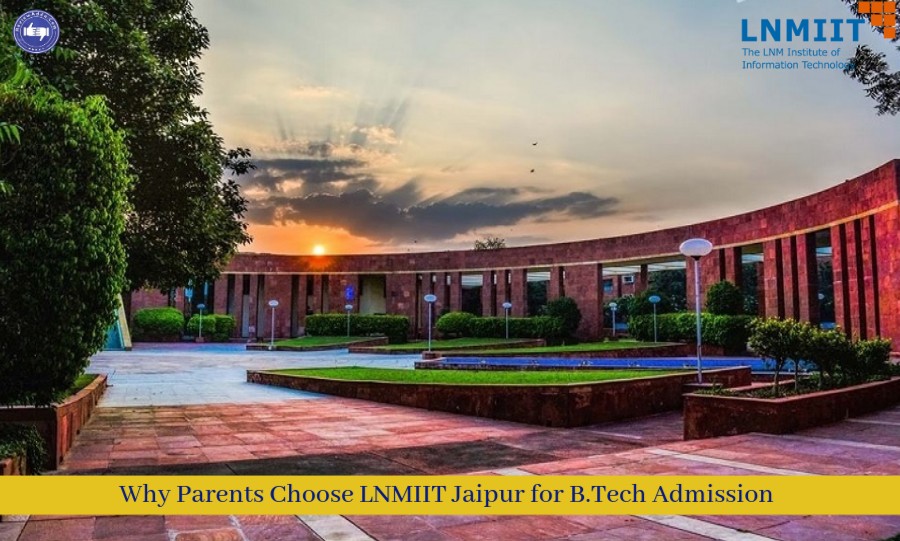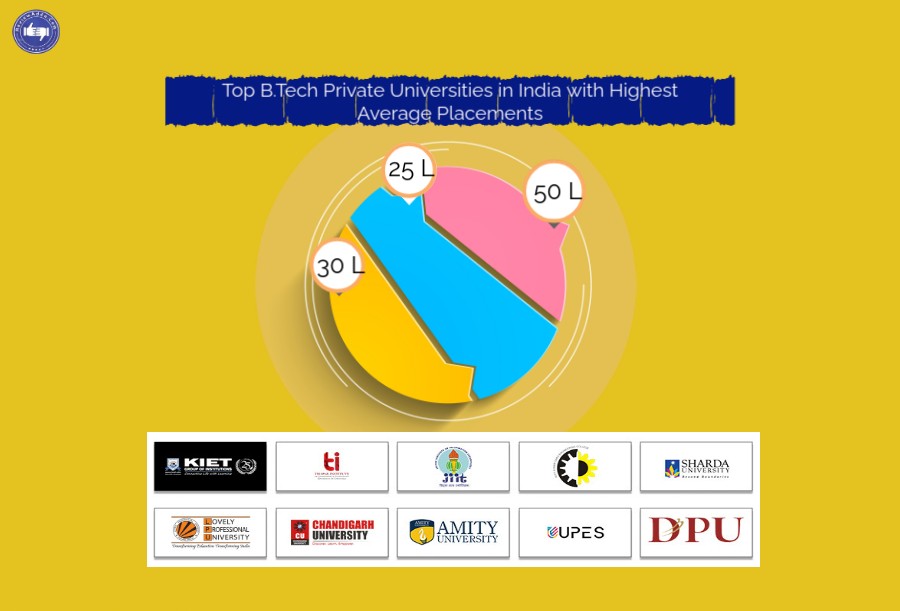Why do students choose Thapar University for the CS branch?
Thapar institution is a famous private institution in Patiala, Punjab, India. It is formally known as Thapar Institute of Engineering and Technology. Thapar University's Computer Science (CS) branch stands out as a top choice for innumerable students seeking to pursue a successful career in the IT sector because of its dedication to excellence in education and research.
The Thapar Institute of Engineering and Technology (TIET) is the oldest of the Deemed to be Universities, producing highly competent personnel for both the country and beyond. TIET was created in Patiala in 1956, and the campus spans 250 acres. It has been considered as the pioneer institution for engineering education, research, and innovation.
This institute has been accredited with an 'A+' grade from NAAC. Thapar University's mission is to create a cultured and recognised environment that prepares all students for careers in business. TIET strives for dynamic, creative, and adaptable academic programmes, structures, and methods.
In this blog, we will explore the myriad reasons why Thapar University's CS branch is a preferred destination for students seeking to build a strong foundation in computer science and engineering.
Academic Excellence
Thapar University's CS branch is widely acclaimed for its academic excellence. The curriculum at the university is intended to offer students with a wide grasp of core computer science concepts as well as cutting-edge technology. Faculty members are highly qualified and experienced professionals that provide high-quality education through engaging teaching strategies and hands-on experiences.
Accreditation and Rankings
Thapar University has been routinely listed among the best engineering institutions in India by the National Board of Accreditation (NBA). Such honours and recognition reflect the institute's dedication to maintaining high academic standards and assure students of receiving quality education and training.
Thapar University Fees
The Thapar University fees depend on the course, year of study, and mode of study. The entire fee structure, however, is as follows:
Tuition fees: Thapar University's tuition costs are as follows:
- B.E./B.Tech.: Rs. 14,96,000
- M.Sc.: Rs. 7,06,000
- M.E./M.Tech.: Rs. 8,95,000
- Ph.D.: Rs. 46,730 per semester
Hostel fees: Thapar University's hostel fees are as follows:
- Single accommodation (non-AC): Rs. 42,000 per semester
- Shared accommodation (2-seater): Rs. 36,000 per semester
- Shared accommodation (3-seater): Rs. 29,750 per semester
Other fees: Thapar University's hostel fees are as follows:
- Library fees: Rs. 1,000 per year
- Sports fees: Rs. 1,000 per year
- Medical fees: Rs. 500 per year
- Examination fees: Rs. 1,500 per semester
Thapar University's overall costs might be fairly costly, however the university provides a variety of scholarships and financial assistance alternatives to help students afford their study.
Thapar University offers the following scholarships:
- Thapar University Merit Scholarship: Students are given this scholarship based on their academic performance in the qualifying exams.
- Thapar University Sports Scholarship: This prize is given to students who have excelled in sports.
- Thapar University Financial Aid Scholarship: This scholarship is given to students who are unable to pay their tuition at Thapar University.
Please check the institution's website for further information on the Thapar university tuition and scholarships available.
Research and Innovation
Thapar University fosters a culture of research and innovation, and its CS branch actively encourages students to engage in research projects. Faculty and students collaborate on research initiatives in areas such as artificial intelligence, machine learning, data science, cybersecurity, and others. The institute's research-oriented approach exposes students to cutting-edge technologies and scientific achievements.
Research Facilities
Bio-Medical Instrumentation laboratory
The biomedical instrumentation lab teaches students how to acquire, measure, and restrict various biological signals such as ECG, EEG, and EMG. This lab is outfitted with cutting-edge bio signal measuring equipment such as a Polyrite 4-Channel Machine, Spirometer, Pulse Oximeter, Cross Match I Scan2 Dual Iris Scanner, Ultrasonic Pulser/Receiver with PCI Digitizer Card, Bio-Medical Instrumentation Modules and Simulators, EMG Bio-feedback Trainer. It includes brief study of different medical instruments and their use in physiological measurements.
Bioinformatics Lab
Deep learning models and algorithms are used to process 3D MRI data from brain tumours. Detection of new blood vessels in abnormal vascularization in diabetic retinopathy patientsDiffusion MRI Fiber Tractography.
Instrumentation and Control Lab
The field of control and instrumentation is the most advanced level for realising any physical parameters and validating them as real-time systems using hardware equipment. This lab is designed to showcase some state of the art facilities in the various domain areas of Instrumentation and Control (I&C) engineering.
This lab provides state-of-the-art experimental facilities to a PG course, Industrial Instrumentation and Control, as well as essential courses in UG fields such as Electrical and Electronic Measurements, Control Systems and Sensors, and Signal Conditioning.
The equipment available in the lab are of a wide variety like: DC Motor Speed Control Kit with DC Motor Unit, Potentiometric Error Detector, Linear System Simulator, External RC Unit, Compensators Kit with Syncro Transmitter & Receiver Kit, Temperature Control using ON-OFF and PID Controller with external Heater Unit, Dead Weight Pressure Gauge Tester, Proximity Sensor Kit, Strain Gauge Kit, AC Bridges, PC-based Coupled Tank Trainer Kit for studying interacting and non-interacting systems with USB adaptor, Piezoelectric Trainer, and many more.
Industrial Instrumentation Laboratory
The Industrial Instrumentation lab provides training to the students (B. E Electronics (Instrumentation & Control), B.E Electrical, M. E, and PhD) in the field of Industrial Instrumentation and control.
A range of equipment, including the Say bolt Universal viscometer, Rotameter, Humidity training kit, Vibration measurement kit, McLeod Gauge, and others, is offered to demonstrate dynamic processes and monitor numerous process variables. These pieces of equipment have been installed in the lab to allow students and researchers to work in the field of industrial instrumentation and process control.
Further, a dedicated Advanced level process station control containing the advanced software such as LABVIEW and MATLAB has been installed and is currently being used to measure process variables such as to monitor capacitive and ultrasonic sensor, fluid level in tank, remote monitoring of sensor data, etc.
High voltage Engineering Laboratory
High voltage Engineering Laboratory is one of the oldest laboratories at Thapar Institute of Engineering and Technology's Electrical and Instrumentation Engineering Department.
This laboratory is now utilized for practical sessions of the High Voltage Engineering Course in the undergraduate Electrical Engineering degree, as well as M.E. Power Systems. Six postgraduate students recently finished their study on liquid and solid insulations with industry participation in 2019.
One Ph.D. student is now working on the creation of an ester oil-based insulating nano-fluid for power transformers.
Network Analysis and Synthesis Laboratory
The Network Analysis and Synthesis Laboratory was established in 2016 with the launch of a design-based course called Network Theory and Design, which included self-effort hours. Students create and test ac network theorems, two port network parameters, and filter and attenuator designs for electronic applications.
In this laboratory, students are expected to complete a small project linked to the course Network Theory and Design. In this laboratory, students are also exposed to hardware as well as simulation using PSPICE and MultiSIM software.
Power System Simulation laboratory
Modelling, simulation, optimisation, power quality, and electric power system planning are among the research topics of the Power system simulation laboratory. Aside from cutting-edge computational infrastructure, it also maintains a collection of engineering application software, including MATLAB and application-specific tool boxes, DigSilent Power factory, MultiSIM, PSCAD, and FEADCOM.
Process Dynamics & Control Laboratory
The purpose of the laboratory is to develop the fundamental concepts and principles of process control among the students. The lab is well equipped with various set-ups, used to study the open-loop and closed-loop dynamics of different types of processes, interfaced with software such as MATLAB and PLC for controlling purpose.
A variety of trainers for Level and Flow Control, Pressure Control, Temperature Control, Electro Hydraulic and Electro Pneumatic Trainer, Current to Pressure and Pressure to Current Converter, and Control Valve Trainer are available.
Real-Time Laboratory
In the context of intermittent renewable energy sources, an electric vehicle charging station can act as a voltage and frequency regulator within the real-time capability of the available EVs. Energy Management of the Smart Home utilising Cloud Infrastructure-A Utility viewpoint.
Thapar Freescale Laboratory
The Thapar Freescale Systems Lab was created in April 2010 as part of an industry relationship with Freescale Semiconductors Ltd (Now NXP India), Noida to encourage UG and PG students to design and build microcontroller-based systems. Thapar Institute developed two PG courses and one UG course related to the infrastructure provided by the Freescale semiconductors Ltd.
NXP improved technical assistance even further by adding more student learning kits. NXP added 20 additional ARM core-based FRDM boards in 2015.
A 2-channel digital oscilloscope, ARM-based boards, 16-bit microcontroller-based students learning kits, and a high-end soldering station are among the cutting-edge tools. Raspberry Pi-3, IoT development kits, Zigbee, and Ethernet modules for embedded systems are all available.
Industry-Relevant Curriculum
Thapar University's CS curriculum is regularly updated to keep pace with the rapidly evolving technology landscape. To guarantee that the curriculum stays industry-relevant and coincides with the current trends and expectations, the school maintains close links with industry partners and top tech firms. Students develop information and abilities that companies value, making them competitive in the employment market.
Internship and Industry Exposure
Thapar University places great emphasis on providing practical exposure to its CS students. Internships and industry trips are facilitated by the institution, allowing students to work on real-world projects and connect with experts in the technology sector. Students benefit from this exposure because it bridges the gap between academic principles and their practical implementations.
State-of-the-Art Infrastructure
Thapar University's Computer Science division has cutting-edge infrastructure, including contemporary laboratories, well-equipped computer centres, and cutting-edge research facilities.
Thapar University is proud of its cutting-edge infrastructure, which refers to the sophisticated and cutting-edge amenities available to its students, faculty, and staff. The institution has made great efforts to foster an environment favourable to learning, research, and general development.
Thapar University's cutting-edge infrastructure includes the following features:
- Academic Facilities: Thapar University is proud of its cutting-edge infrastructure, which refers to the sophisticated and cutting-edge amenities that it provides to its students, teachers, and staff. The institution has made great efforts to foster an environment favourable to learning, research, and general development.
- Library Resources: Thapar University's library is big and well-stocked, with a wide range of books, journals, research papers, and digital resources. The library is well-stocked and provides access to internet databases, assisting the university community's academic and research requirements.
- Recreational Spaces: Sports complexes, gymnasiums, and green areas are examples of campus recreational amenities that encourage physical well-being and a healthy lifestyle among students and instructors..
- Research Centers: The university features specialised research institutes and labs that promote innovation and advanced research in fields like as engineering, science, technology, and social sciences.
- Health and Medical Services: Thapar University promotes community health by providing on-campus health services like medical facilities and counselling.
- Residential Accommodations: Thapar University offers students convenient and safe on-campus housing, allowing them to immerse themselves in a complete academic experience while cultivating a feeling of community.
- Digital Infrastructure: The university's digital infrastructure is well-developed, with high-speed internet access available around campus to support online study, research, and communication.
- Accessibility and Inclusivity: Thapar University makes steps to make its infrastructure accessible to everyone, including accommodations for those with impairments.
- Transportation: The university provides transportation facilities, making it convenient for students and staff to commute to and from the campus.
Placement Opportunities
The CS branch at Thapar University has an outstanding placement record. The institute's placement cell actively collaborates with numerous companies from various sectors, ensuring that students receive ample placement opportunities. Leading tech giants, startups, and multinational corporations visit the campus to recruit talented CS graduates, further solidifying Thapar University's reputation as a preferred talent pool for employers.
The University has announced the 2023 placement data, which are valid through July 15, 2023. In 2023, the number of students placed was about 11% greater than in 2022. Similarly, the overall number of offers made in 2023 was larger than in 2022. On the contrary, the number of enterprises participating has decreased from 395 in 2022 to 334 in 2023. Check out the chart below for the important highlights of Thapar University placements in 2022 and 2023:
|
Particulars |
Placement Statistics (2022) |
Placement Statistics (2023) |
|
Companies visiting |
395 |
334 |
|
Total offer |
1,867 |
1,884 |
|
Total students placed |
1,604 |
1,774 |
|
Single offer |
1,341 |
1,664 |
|
Multiple offers |
263 |
110 |
Alumni Network
Thapar University's strong and expansive alumni network plays a crucial role in shaping its students' career trajectories. Alumni actively engage with the university, organizing guest lectures, workshops, and mentoring sessions to guide and inspire current students. The network provides invaluable industry insights and fosters a sense of belonging and support among Thapar graduates.
Industry Tie-ups and Collaborations
Thapar University works extensively with industrial partners, research organisations, and academic institutions to provide students with a variety of possibilities for skill development, internships, and research projects. These collaborations strengthen the learning experience and provide students a comprehensive view of the industry world.
Co-Curricular and Extracurricular Activities
Thapar University boasts an active campus life with a variety of co-curricular and extracurricular activities. Students can expand their abilities and interests by participating in coding challenges, hackathons, technical symposiums, and seminars. In addition to cultural festivals, athletic events, and technical fests, the institution provides a comprehensive growing environment.
Student Support Services
Thapar University offers comprehensive student support services to guarantee its students' well-being and academic performance. The institute provides counselling services, mentorship programmes, and academic aid to students, assisting them in overcoming obstacles and thriving in their academic path.
Thapar University is committed to offering comprehensive student support programmes that address its students' general well-being and academic development. The institution recognises the obstacles and expectations that students confront during their educational journey and seeks to establish a supportive atmosphere that will assist them in succeeding.
The key components of the student support services at Thapar University include:
Mentorship Programs: Thapar University implements mentorship programs where experienced faculty members or senior students act as mentors to guide and support newer students. These mentors offer vital advise, share their academic experiences, and help students acclimatise to university life, which is especially beneficial for newcomers.
Academic Assistance: The institution provides a variety of academic support initiatives to ensure that students receive the assistance they require to succeed in their studies. Tutoring, study groups, training on study techniques, time management, and academic planning are examples of these services.
Personal Development Workshops: Thapar University organizes workshops and seminars to help students grow personally. Communication skills, leadership development, stress management, and work preparation are among the themes covered in these courses.
Health and Wellness Programs: The university prioritises physical health and well-being. It gives students access to health services, fitness facilities, and educational initiatives to promote a healthy living.
Accommodation Support: Thapar institution assists students with housing-related questions and issues, ensuring that they have a pleasant living environment while at the institution.
Conclusion
Thapar University's Department of CS is a good choice for students interested in jobs in computer science and engineering. Students who enroll in Thapar University's Computer Science curriculum open up a world of possibilities, preparing them for a satisfying and influential career in the ever-changing technology area.




.jpg)
